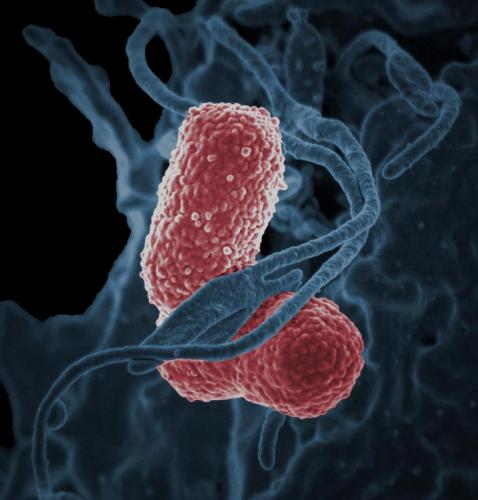NIH scientists describe potential antibody approach for treating multidrug-resistant Klebsiella pneumoniae
Promising concept may lead to an alternative to antibiotics.
Researchers are developing a promising alternative to antibiotic treatment for infections caused by Klebsiella pneumoniae bacteria resistant to carbapenem antibiotics. The approach uses antibodies to target the K. pneumoniae protective capsule polysaccharide, allowing immune system cells called neutrophils to attack and kill the bacteria. The early stage, in vitro research was conducted by scientists at the National Institute of Allergy and Infectious Diseases’ (NIAID) Rocky Mountain Laboratories and the New Jersey Medical School-Rutgers University.

Klebsiella bacteria.
Klebsiella bacteria cause about 10 percent of all hospital-acquired infections in the United States. A carbapenem-resistant K. pneumoniae strain known as multilocus sequence type 258 (ST258) is one of the antibiotic-resistant organisms labeled an urgent threat by the Centers for Disease Control and Prevention. ST258 is particularly concerning because it is resistant to most antibiotics. It is a significant cause of mortality among people with bloodstream infections.
The researchers first determined that the bacterial capsule prevents immune system neutrophils from ingesting and killing ST258. They then extracted capsule from the two most abundant capsule types of ST258 and used them to generate antibodies in rabbits. In cell culture experiments they found that one of the antibodies enhanced the ability of neutrophils to ingest and kill bacteria. These results are a “proof of concept” for a potential immunotherapy approach for treatment of multidrug-resistant K. pneumoniae infections, the authors write.
Next up, the researchers will test the therapeutic concept in mice. They also will compare immunization with purified capsule polysaccharide as a preventive approach (active immunization) versus using capsule-specific antibodies as a therapy (passive immunization). Ultimately, they hope either antibody treatment alone or in combination with antibiotics could greatly improve care for people with multidrug-resistant K. pneumoniae infections.
Source: U.S. National Institutes of Health
- 258 reads
Human Rights
Ringing FOWPAL’s Peace Bell for the World:Nobel Peace Prize Laureates’ Visions and Actions

Protecting the World’s Cultural Diversity for a Sustainable Future

The Peace Bell Resonates at the 27th Eurasian Economic Summit

Declaration of World Day of the Power of Hope Endorsed by People in 158 Nations

Puppet Show I International Friendship Day 2020

